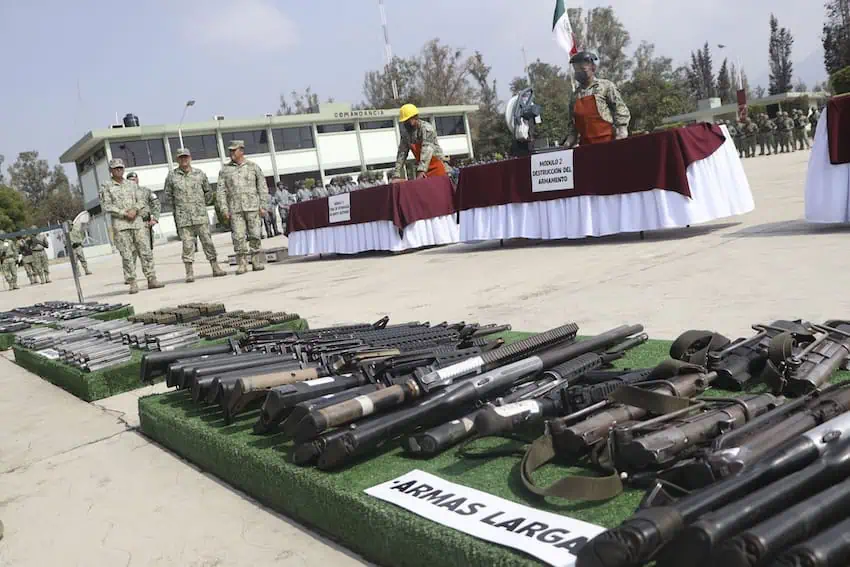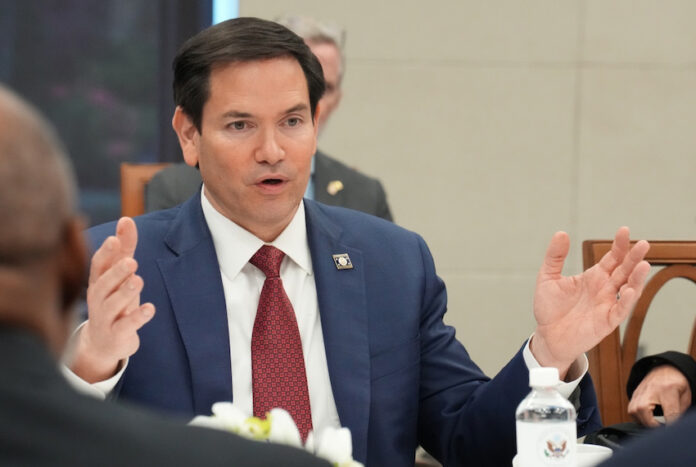United States Secretary of State Marco Rubio on Wednesday acknowledged the murder of two mayoral aides in Mexico City, declared that political violence in Mexico is “real” and asserted that the U.S. wants to help stop the southward flow of weapons that often end up in the hands of cartel henchmen.
In an appearance before the United States House of Representatives’ Foreign Affairs Committee, he also said that the Mexican government has been “very responsive on our security concerns” and “increased their security cooperation with us.”
Responding to a question from Congressman Michael McCaul of Texas, Rubio noted that he “heard last night [that] two more people were murdered in Mexico City, associated with the mayor of Mexico City.”
“The political violence there is real,” he said.
Rubio was referring to the murder on Tuesday morning of Mexico City Mayor Clara Brugada’s personal secretary, Ximena Guzmán, and José Muñoz, an advisor.
A man was captured by security cameras committing the crime on a busy avenue south of Mexico City’s historic center, but no arrests have been reported. Authorities are seeking to detain four people in connection with the murders, Mexico City Security Minister Pablo Vázquez Camacho said Wednesday.
As Rubio remarked, political violence in Mexico is indeed “real,” but Mexico City has been largely spared the kinds of attacks on politicians that are common in some other parts of the country. That made Tuesday’s double homicide — which experts believe was an organized crime hit carried out to send a message to Brugada’s administration — all the more shocking.
Among other remarks, Rubio told McCaul, the chair of the Foreign Affairs Committee, that there have been “irritants” in the United States’ relationship with Mexico, but also “areas of cooperation.”
“… It’s been actually pretty positive. They have been very responsive on our security concerns, they’ve increased their security cooperation with us in ways that have been very productive,” said the secretary of state, a former U.S. senator for Florida.
In February, President Claudia Sheinbaum deployed 10,000 National Guard troops to Mexico’s northern border region to stave off a tariff threat from U.S. President Donald Trump, while her government has ramped up enforcement against organized crime and allowed the CIA to fly drones over Mexico to spy on drug cartels and hunt for fentanyl labs.
The security concerns Rubio referred to are, most notably, the entry of narcotics, especially fentanyl, and migrants to the United States from Mexico.
The secretary of state also said on Wednesday that he “intended to travel potentially to Mexico” in “the next few weeks” along with “a couple of other cabinet members to sort of finalize some of these areas of cooperation.”
What are Rubio’s main concerns about Mexico?
“… We’ve been primarily focused with Mexico on two things. One is on trade, which is not my department, but obviously our Trade Representative Mr. Greer and also Commerce Secretary Lutnick has been engaging with them,” Rubio said, referring to negotiations over tariffs imposed by the United States on some imports from Mexico.
“And then the other is on security cooperation. We have a mutual interest in Mexico. In essence the cartels that operate within Mexico and threaten the state are armed from weapons that are bought in the United States and shipped there. We want to help stop that flow,” he said.
“The reverse is those cartels threaten the state. There are parts of Mexico that are governed by cartels,” Rubio said, referring to criminal organizations such as the Sinaloa Cartel and the Jalisco New Generation Cartel, which, along with four other Mexican cartels, were designated as foreign terrorist organizations by the U.S. government in February.
Earlier this month, the United States Bureau of Alcohol, Tobacco, Firearms and Explosives reported that nearly 9,700 firearms bound for Mexico had been seized since Trump began his second term on Jan. 20.

The Mexican government has long called on its U.S. counterpart to do more to stop the southward flow of firearms, which are commonly used by cartel members to commit murders and other crimes in Mexico.
It appears to be pleased with the efforts made by the second Trump administration so far.
On May 6, Sheinbaum described as “historic” a recent statement released by the United States government declaring what she called a new “mano dura” (heavy hand or iron fist) approach to gun smuggling from the U.S. to Mexico.
On Wednesday, Rubio said that the Mexican government has a “vested interest and a desire to go after these cartels, and we want to help equip them and provide them information.”
“They’ve also been increasingly cooperative, more than ever before, in bringing back and extraditing people wanted in this country,” he added.
“… So I think we’ve got good areas of cooperation. We still have some more work to do on migration, but they’ve been cooperative,” Rubio said.
By Mexico News Daily chief staff writer Peter Davies (peter.davies@mexiconewsdaily.com)
